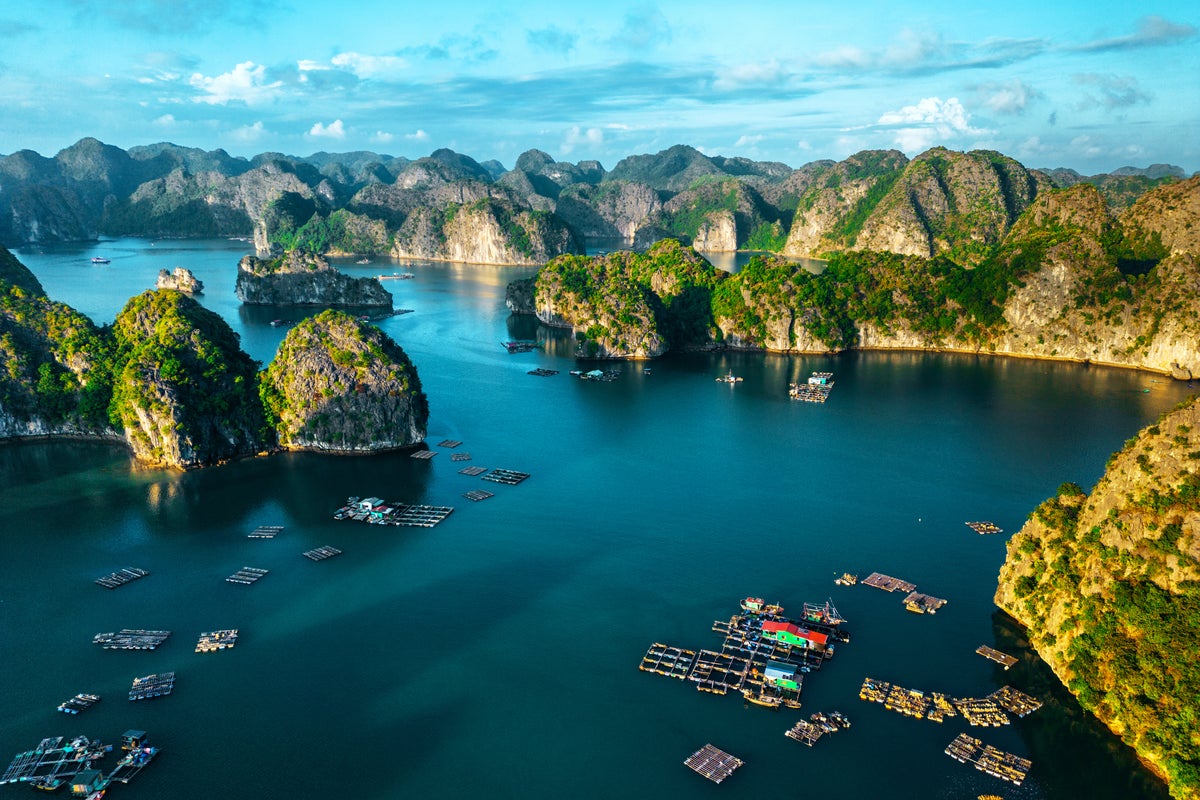
Vietnam, a southeast Asian country with bountiful charm, cultural diversity and culinary delights, boasts striking scenery for both a blissful holiday on white sands and backpacking adventures through Unesco World Heritage Sites such as Ha Long Bay.
The versatility of the Vietnamese landscape, with its urban hubs such as the capital Hanoi, rolling rice fields and limestone mountains, is what makes Vietnam an oasis for nature lovers and adventurers alike.
Buddhist pagodas, lantern festivals and wellness retreats are highlights of a visit, alongside tours (fuelled by local coffee made with condensed milk) through fresh food markets. Meanwhile, heritage trails to historic sites from the Vietnam War (known in Vietnam as the American War) and the Communist era are sure to entice history buffs.
There are also small island archipelagos clustered offshore for paradise-like beach holidays and vast and spectacular national parks for trekking. While global tourist hotspots, like the largest city Ho Chi Minh, beg to be explored.
From where to stay and when to travel, here are The Independent’s selection of holiday destinations to inspire your next trip to Vietnam.
The best Vietnam holiday destinations
1. Hanoi
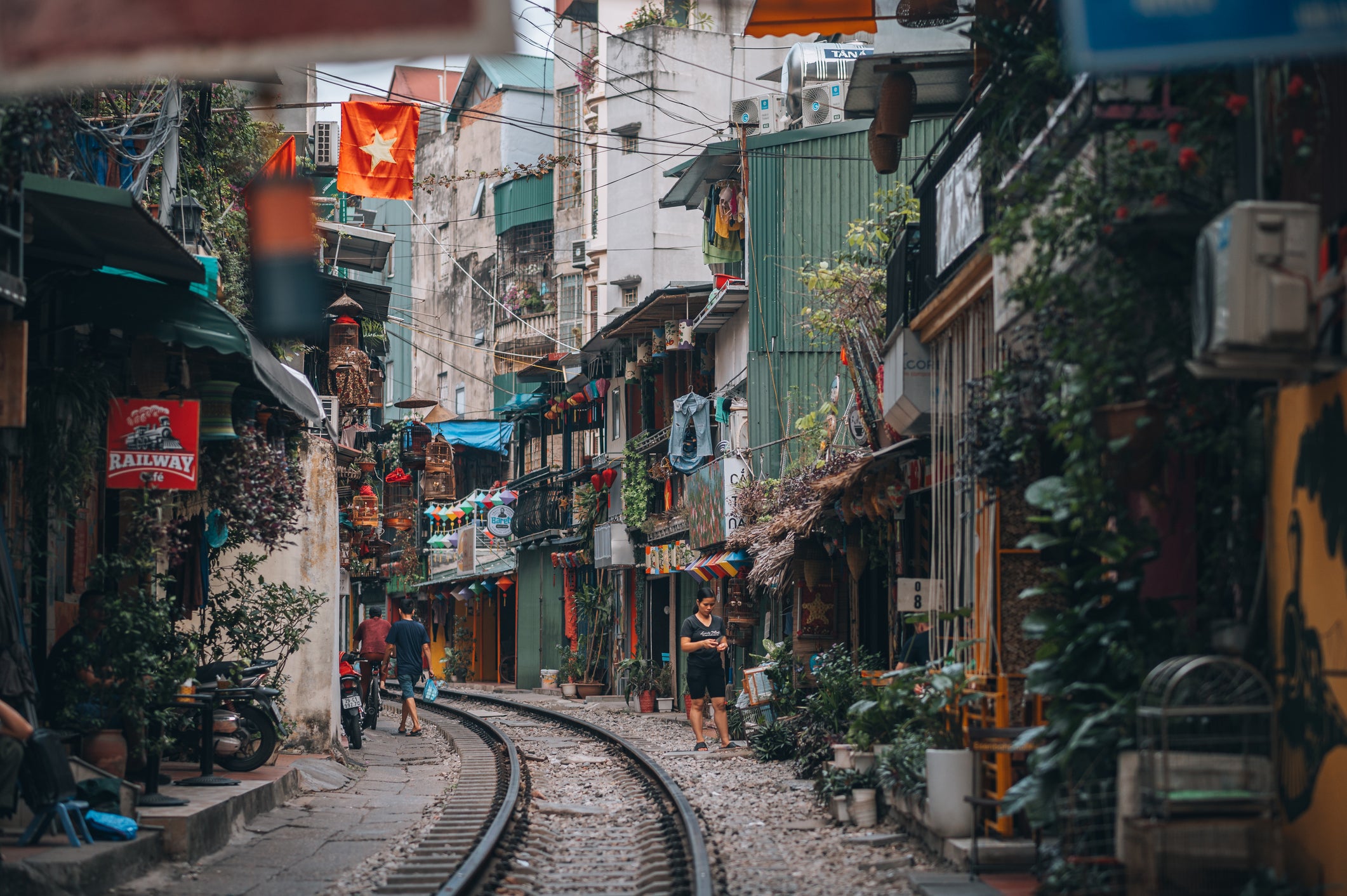
Vietnam’s cosmopolitan capital in the north, Hanoi, is home to buzzing night markets, narrow trade streets and Buddhist temples, with a fusion of historical and 21st-century sights creating its lively atmosphere. Ancient paths through the 14th-century Old Quarter jostle with contemporary art galleries, while the city’s authentic cuisine is best tasted by indulging in street food such as Pho and bun cha, the budget options abundant between pint-sized watering holes on the chaotic urban track of Train Street.
When to visit Hanoi
A good time to visit Hanoi is from April to November, as temperatures are the highest and rainfall predictions are the lowest. Average daily temperatures reach highs of 28C in the April shoulder season.
Where to stay
Scent Premium Hotel is the ultimate modern stay in Hanoi. Elegant rooms are fitted with en-suite bathrooms, mini-bars and have city and lake views, with breakfasts included in the stay in the heart of the Old Quarter.
Read more: Hanoi city guide: Where to stay, eat, drink and shop in Vietnam’s buzzy capital
2. Ho Chi Minh City
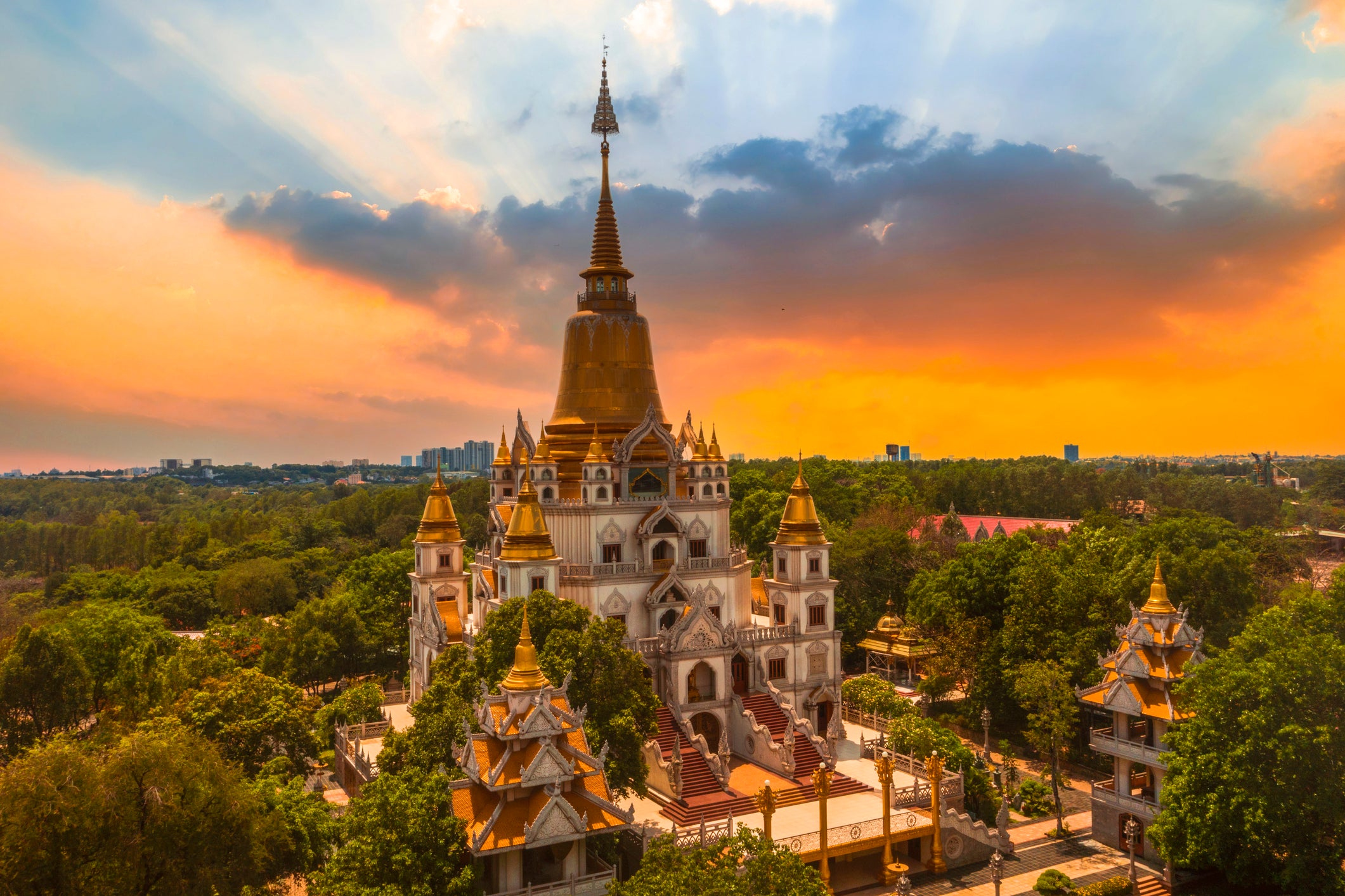
Formerly known as Saigon, Ho Chi Minh City in the southeast is the economic capital of Vietnam and is also its most heavily populated region. In a marriage of tradition and modernity, Ho Chi Minh is the metropolis where pagodas meet skyscrapers and innovative commerce hubs thrive. Elaborate French colonial architecture, including the Notre Dame Cathedral and landmarks such as the War Remnants Museum and the Cu Chi tunnel network used by the Viet Cong during the American War, are historical highlights in this fast-paced city.
When to visit Ho Chi Minh City
It’s dry season from December to March, which is an ideal time to go. The hottest month for a trip to Ho Chi Minh is April, where average highs of 35C can be sweltering compared to comfortable lows of 24C in the coolest month, December.
Where to stay
Fusion Original Saigon Centre offers guests an outdoor pool, a restaurant and an attractive central location. Eccentric artwork accents the walls of spacious rooms with cosy seating areas, sprawling city views and comfortable beds.
Read more: The unlikely tourist spots attracting thousands of visitors each year
3. Hạ Long Bay
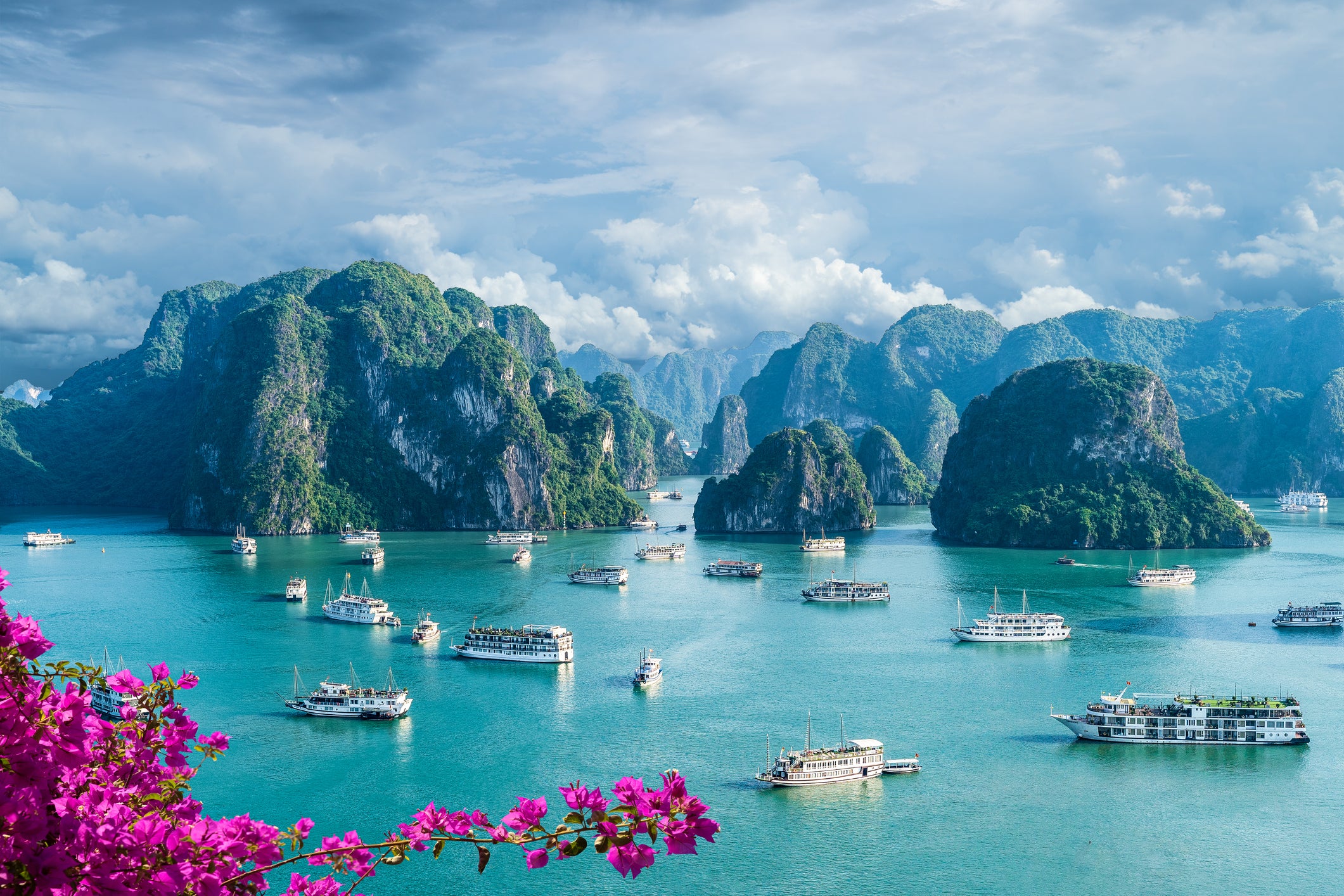
Postcard-perfect scenery greets visitors cruising to Hạ Long Bay in northeast Vietnam. A Unesco World Heritage Site since 1994, Hạ Long, meaning “descending dragon”, is one of Vietnam’s most spectacular natural wonders. Emerald waters, 1,600 islets, off-shore islands – mostly uninhabited – and caves dot the diverse landscape, where limestone rock formations are millions of years old. Scuba diving and sea kayaking with marine life to floating fishing communities are popular pastimes on this part of the Gulf of Tonkin. On land, rock climb and hike in mountainous Cát Bà National Park or absorb the mystical aura of Hạ Long Bay from a long stretch of golden beach.
When to visit Hạ Long Bay
The shoulder tourism seasons of March, April, September and October are the best time to visit Hạ Long Bay for optimum weather conditions that avoid the monsoon season. The year-round daily temperature is 29C, with June being the hottest month.
Where to stay
Budget stays at Bao Phuc Hotel offer guests a shared lounge, terrace and cosy doubles just 600m from Tung Thu Beach. There’s also an à la carte or Asian breakfast and friendly staff at the accommodation ideal for a stopover in Cat Ba on a boat tour of Hạ Long Bay.
Read more: Exploring Vietnam’s untouched landscapes by motorbike
4. Phú Quốc
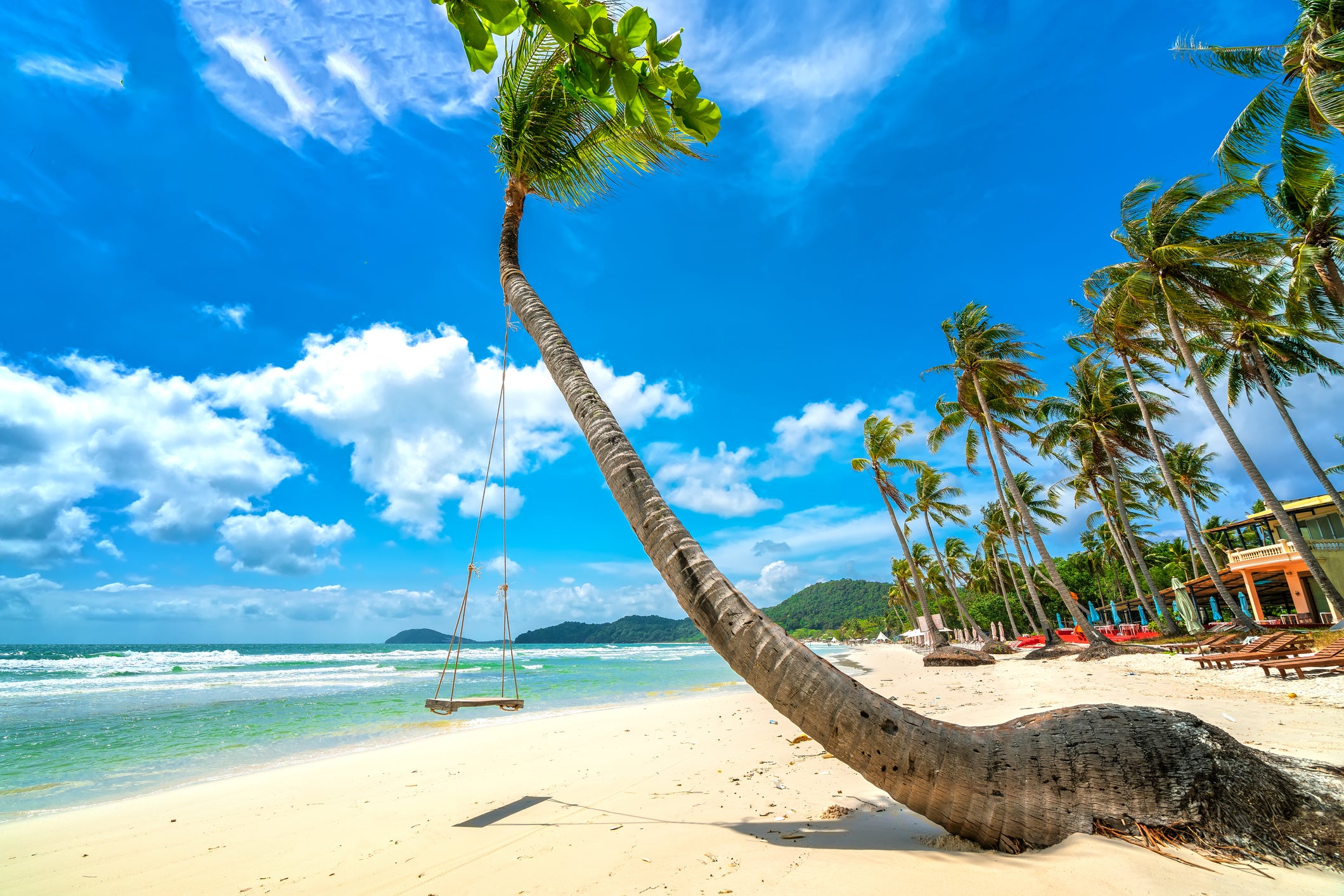
Think seafront resorts on white powder beaches and palm-fringed shores in Phú Quốc island in the Gulf of Thailand, a protected Unesco Biosphere Reserve since 2006. The largest of Vietnam’s islands, with 150km of unspoiled coastline, it’s the ideal tropical holiday destination with secluded coves, vibrant nightlife and authentic day and night seafood markets in Duong Dong town. The fish sauce in particular is hailed as a treat for the tastebuds. Phú Quốc National Park blankets more than half the island with dense jungle and rainforest and hiking trails are plentiful. Coined “Pearl Island” by the locals for its gleaming sands and pearl farms, Phú Quốc offers winter sun and spectacular sunsets from the famous beaches of Sao Beach and Long Beach.
When to visit Phú Quốc
October to April are the driest months to visit Phú Quốc, with daily temperatures reaching up to 32C.
Where to stay
A few steps from Long Beach, Salinda Resort in Phu Quoc exudes luxury and authentic Vietnamese charm. Buffet breakfasts also include American and Italian cuisines and are included in your stay, while an in-house bar, terrace and billiards tables await guests staying in the sea-view rooms.
Read more: There is a Bali beyond influencer’s Instagram reels – and it’s better
5. Hội An
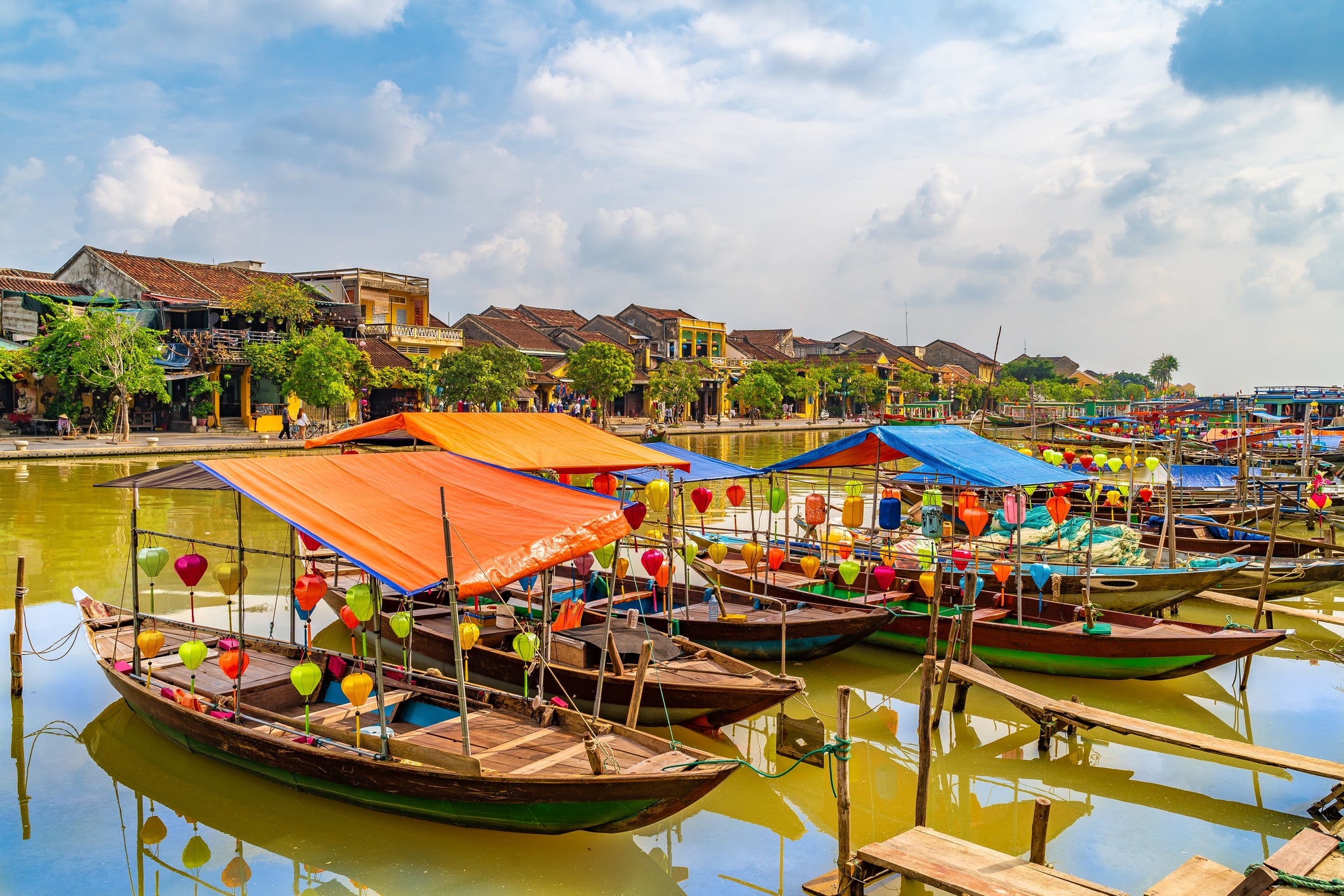
Step back in time to the ancient charm of Hội An city on Vietnam’s central coast. Colourful temples, shophouses and budget boutique hotels line canals and the rustic Old Town district amid several family farms cultivating local produce for the markets. Sometimes referenced as the “Venice of Vietnam”, the beguiling former trading port at the mouth of the Thu Bon River was a settlement for merchants in the 15th century and the legacy of the Chinese, Japanese and European cultures remains evident in the cuisine (bahn mi is a speciality) and grand design of the lantern-lit streets.
When to visit Hội An
The best time to visit Hội An is between February and July, the height of the summer season. The daily temperatures are around 26-35C during these months before the monsoon season takes hold in winter.
Where to stay
Hoi An Golden Holiday Hotel boasts modern rooms with skyline views for bargain prices. A five-minute drive from the centre of Hội An, an outdoor pool, shuttle services and included breakfasts welcome visitors to the ancient town.
Read more: The little-visited region that could solve Japan’s overtourism problem
6. Nha Trang
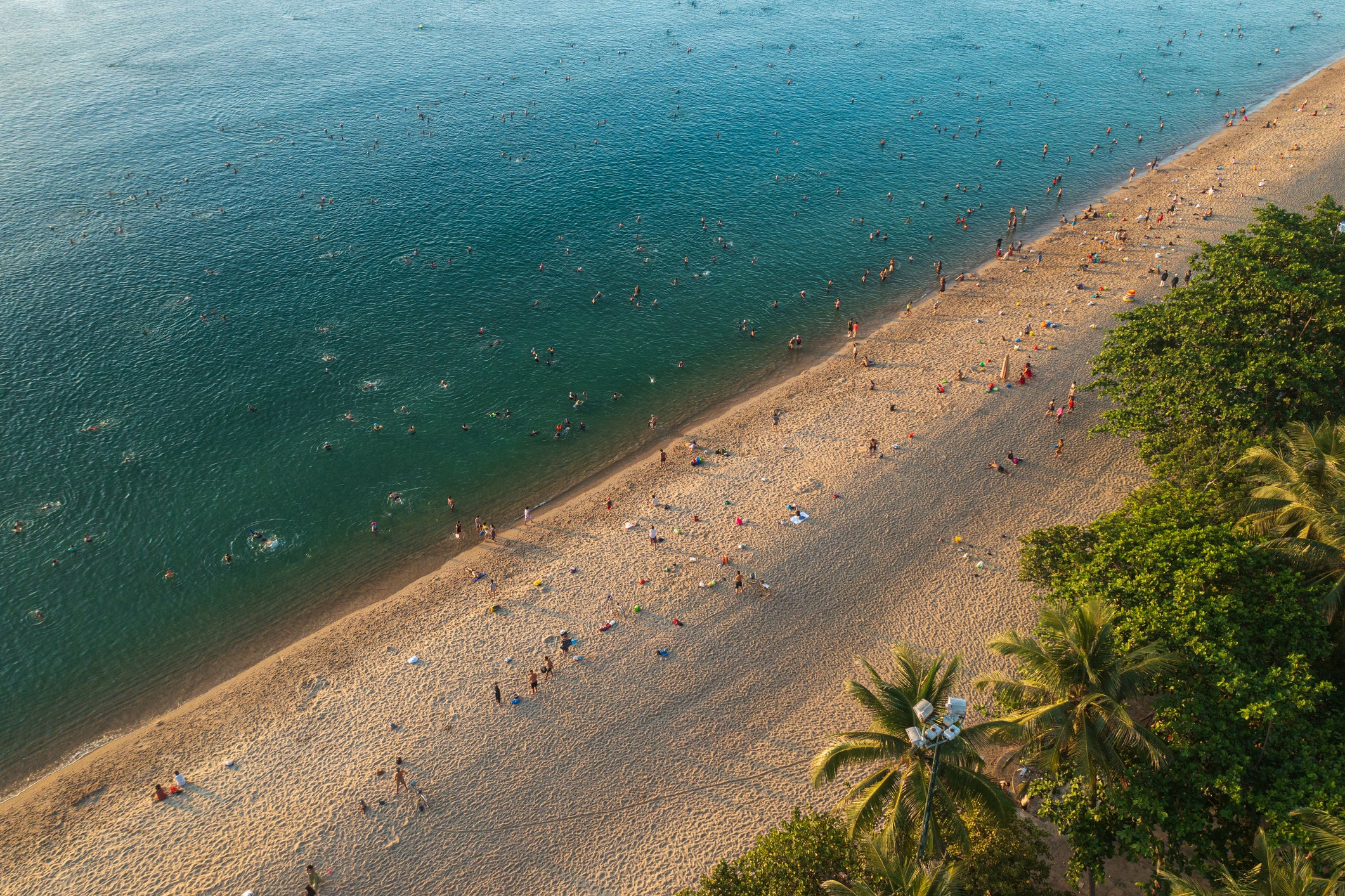
Nha Trang, Vietnam’s crowning jewel of coastal resorts in the south, is a tourism hub with 6km of golden sand beaches, untouched archipelagos and azure waters framed by a high skyline and rolling hillsides. The popular scuba and backpacking spot is also home to ruins and architecture from the ancient Champa Kingdom, including the Po Nagar towers. Intersecting streets make it easy to explore the unique salt fields, hot springs and waterfalls of Nha Trang on foot and there’s even an island theme park for families and thrillseekers to enjoy, connected to the mainland by a 3,320m sea-crossing cable car.
When to visit Nha Trang
Head to Nha Trang during February-May for average daily temperatures of around 26C, or in June and July for higher temperatures but a greater risk of rainy days but a chance to catch some of Nha Trang’s summer festivals.
Where to stay
If affordable rooms and sea view swimming pools in a beachfront location are your hotel non-negotiables, Azura Gold Hotel should fit the bill. Less than 100m from Nha Trang Beach, the tropically decorated Azura is an ideal spot for soaking in the sunshine.
Read more: How Singapore forged a world-class food scene over the past 60 years
7. Huế
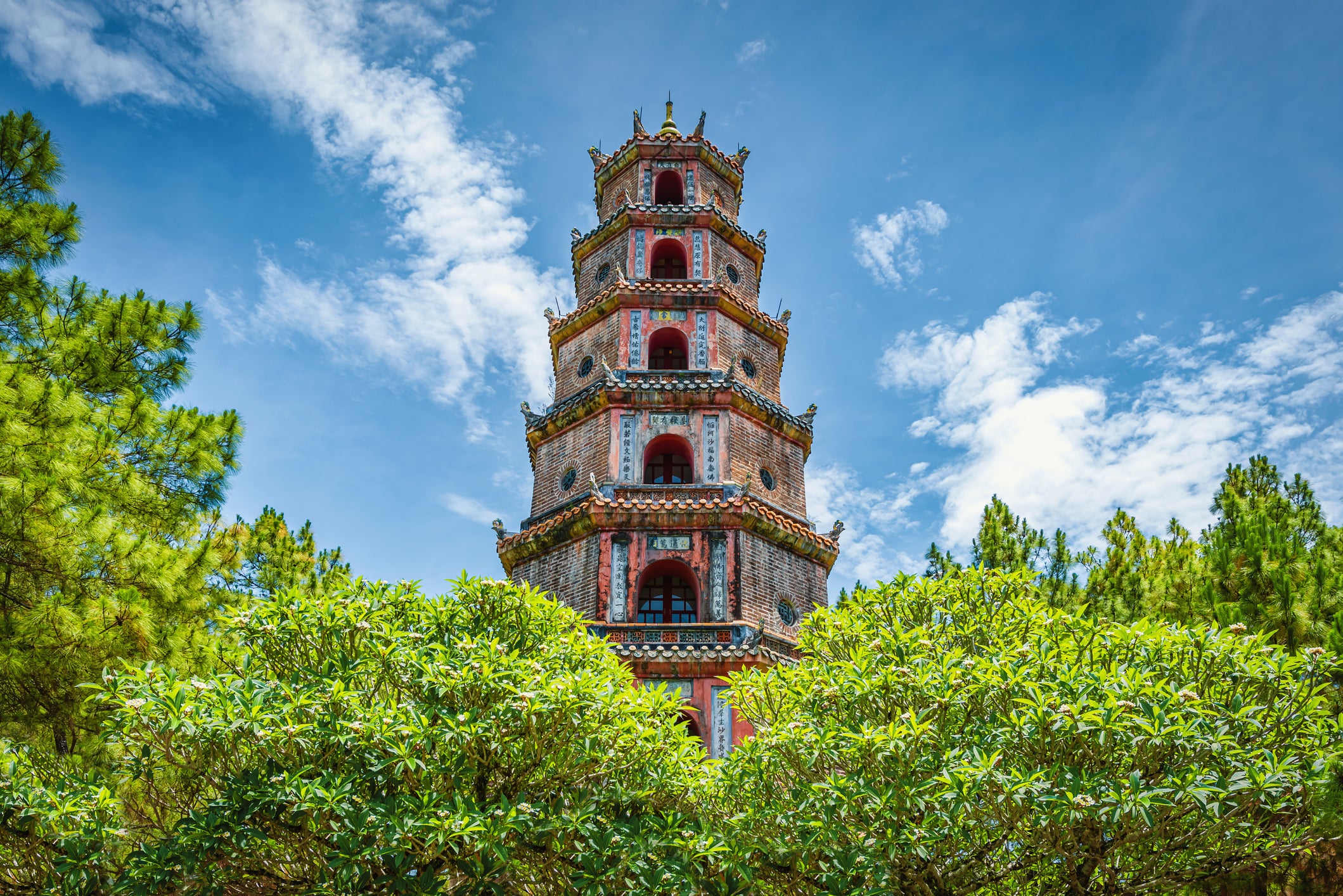
Once the national capital of Vietnam (from 1802 to 1945) and the seat of the ancient Nguyen Dynasty, the dynamic city of Huế boasts a long history of imperial glory as seen in the ornate shrines and palaces that surround the intersecting Perfume River. Reminders of the once royal riverside town include a Unesco-designated site, the Complex of Huế Monuments in Thua Thien, and the Forbidden Purple City, once home to the imperial family – their tombs remain, highlighting the decadent and luxurious lives once lived in the 19th-century Đại Nội citadel. Embrace Huế’s slow pace of life while exploring the exotic landscape and feast like a king on Bun Bo Hue and local produce from the fertile landscape.
When to visit Huế
January to April is an ideal time to visit Huế, as it’s after the peak of monsoon season. While you can still expect daily rainfall from Huế’s tropical climate, a light drizzle can be a refreshing break from average daily temperature peaks of 25-35C.
Where to stay
Pilgrimage Village Boutique Resort offers unrivalled luxury and world-class service in the tranquil Thua Thien Huế. The rustic resort features Vietnamese restaurants, spa treatments and hospitality with complimentary busses shuttling travellers into Huế. Huts, bungalows and villas dot the lush jungle – some with private pools and wellness facilities.
Read more: Why you need to take the slow boat from Thailand to Laos
8. Mai Chau

If a nature retreat is what you are after, there is no better place to travel to than the small villages of Mai Chau, surrounded a by sprawling patchwork of paddy fields and dense green mountains. Mai Chau’s relative proximity to the capital makes for an easy escape from the bustling metropolis to more quieter, peaceful ventures immersing yourself in rural Vietnamese life. For a whistlestop tour around the rice paddies and stilt house villages, hire a bike for a serene ride among the tranquil landscape, or for a deeper delve into the lush vegetation, plan a day trip kayaking on Hoa Binh Lake. For a taste of rural lifestyle, seek out the home-cooked cuisine at homestays prepared by locals, or head to the Sunday markets to discover highly-skilled weavers and their intricate fabric offerings.
When to stay in Mai Chau
Weather in the Mai Chau Valley is at its prime from March to May and September to November, however, October is often touted as the best month to go as the harvest takes place. The tourist office warns of going from June to August as monsoons can impact local roads.
Where to stay
For the most authentic experience, seek out a homestay, which are popular in two Mai Chau villages: Lac and Pom Coong. Among the favourites is Mai Chau Countryside Homestay, which provides simple accommodation with private bathrooms, set beneath unmatched mountain views. The homestay also offers a traditional restaurant, bar and a paid airport shuttle service.
Read more: Luxury holidays in Thailand are cheaper than you ever imagined
9. Ba Be National Park
Choosing between Vietnam’s 34 national parks can be overwhelming and those rooted on the tourist trail are often overrun with visitors. Instead head to lesser-trodden Ba Be National Park in Bắc Kạn Province in the northeast region for a lush forest boasting over 550 different plants and a large freshwater lake surrounded by limestones karsts. A playground for outdoor adventurers, trek between Hmong, Tay and Dzao villages and delve into craggy caves, all while keeping an eye out for black bears and pangolins.
When to visit Ba Be National Park
The dry season from October to April is the best time to go, offering an average temperature of 22C and lower rainfall for outdoor activities.
Where to stay
Nestled just off the lake, Ba Be Jungle Houses’ infinity swimming pool, terrace and garden ensure you don’t miss a second of the exceptional surrounding beauty. Designed with nearby villages in mind, the homestay embraces Tay cuisine, design and specialities, and can arrange tours to explore the reserve.
Read more: Vietnam’s lesser-known destinations away from the tourist trail







